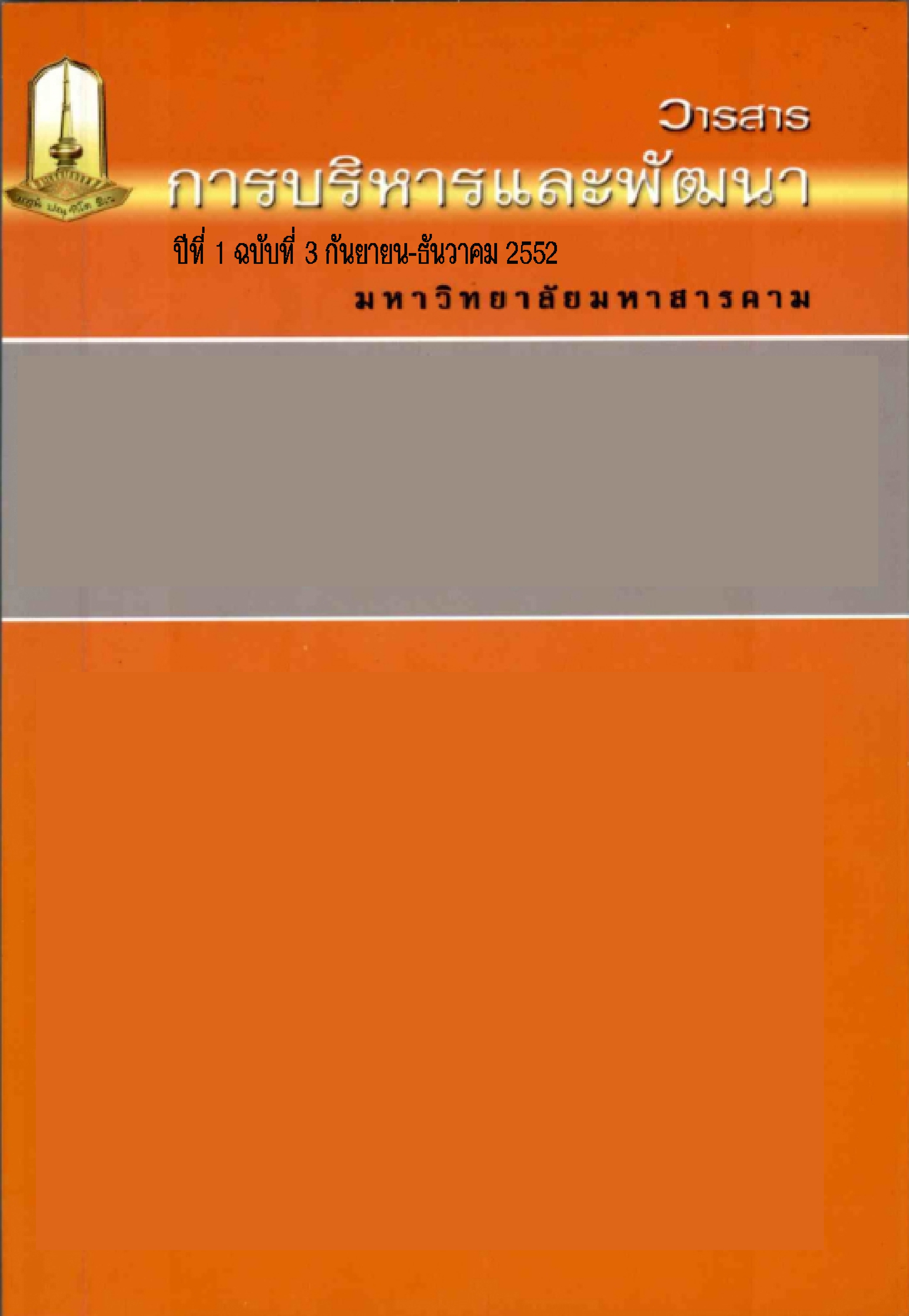Factors Affecting The Mastership Model of Lab Schools in The Northeastern Part of Thailand
Main Article Content
Abstract
The purposes of this research were (1) to study using the administrative factors of the mastership model of lab schools and the regular schools, (2) to find out the administrative factors that can differentiate the mastership model of lab schools from the regular schools and (3) to find guidelines for developing the significant factors that can be used to differentiate the mastership model of lab schools from those of the regular ones. The 640 sample groups comprised of school administrators , deputy school directors , heads of departments, representatives of teachers in the Basic Education School Communities who worked in 40 lab schools and 40 regular schools in Nakhonratchasima, Chaiyapoom, Surin and Buriram. The data were collected using the questionnaires. The data were analyzed by the computer program to find mean, standard deviation and stepwise.
The results of this study were as follow: these were the administrative factors of lab schools was in the high level, which that of the regular schools was in the moderate level. Furthermore, the administrative factors that can differentiate the lab schools from the regular ones were the transformation leadership, the administration behaviors, and the school cultures. The transformational leadership was the main factors to be developed by using 7 steps of training. The administrative factors were the mastership factors that can differentiate the master model of lab schools from the regular schools. The seven steps were the leadership ideas, the characteristics of leadership, preparation of the development, the developing, the evaluating the development, the improving and correcting, the evaluating all the outcomes. Finally, every step has its content of development, objective for developing, process of development and assessment.
Downloads
Article Details
References
กระทรวงศึกษาธิการ. (2546). โครงการหนึ่งอำเภอ หนึ่งโรงเรียนในฝัน. กรุงเทพฯ :สถาบันราชภัฏสวนดุสิต.
คณะกรรมการบริหารงานจังหวัดบูรณาการ. (2547). แนวทางการดำเนินงานจังหวัดแบบบูรณาการจังหวัดนครราชสีมา. นครราชสีมา : โชคเจริญมาร์เก็ตติ้ง.
ถวิล มาตรเลี่ยม. (2545). การปฏิรูปการศึกษาโรงเรียนเชิงฐานการบริหารจัดการ (School– Based Management : SBM). พิมพ์ครั้งที่ 2. กรุงเทพฯ : เสมาธรรม.
บุญเลิศ ไพรินทร์. (2538). เทคนิคเพื่อการเปลี่ยนแปลงความรู้ ทักษะ และทัศนคติ.กรุงเทพมหานคร : รำไทยเพรส.
เบญจพร แก้วมีศรี. (2545). การนำเสนอรูปแบบการพัฒนาคุณลักษณะภาวะผู้นำของผู้บริหารวิทยาลัยพยาบาล สังกัดสาธารณสุข. วิทยานิพนธ์ ครุศาสตรดุษฎีบัณฑิต. กรุงเทพฯ : บัณฑิตวิทยาลัย จุฬาลงกรณ์มหาวิทยาลัย.
รัตติกรณ์ จงวิศาล. (2543). ผลการฝึกอบรมภาวะผู้นำการเปลี่ยนแปลงของผู้นำนิสิตมหาวิทยาลัยเกษตรศาสตร์. ปริญญานิพนธ์ วิทยาศาสตรดุษฎีบัณฑิต (การวิจัยพฤติกรรมศาสตร์ประยุกต์). กรุงเทพฯ : บัณฑิตวิทยาลัย มหาวิทยาลัยศรีนครินทรวิโรฒ.
รุ่ง แก้วแดง และ ชัยณรงค์ สุวรรณสาร. (2536). แนวคิดเกี่ยวกับประสิทธิภาพองค์การประมวลสาระ ชุดวิชาและแนวทางปฏิบัติในการบริหารการศึกษา. นนทบุรี: มหาวิทยาลัยสุโขทัยธรรมาธิราช.
สุวัฒน์ วิวัฒนานนท์. (2548). ปัจจัยเชิงพหุระดับที่ส่งผลต่อประสิทธิผลของโรงเรียนมัธยมศึกษาของรัฐในกรุงเทพมหานคร. วิทยานิพนธ์ ศึกษาศาสตรดุษฎีบัณฑิตสาขาการบริหารการศึกษา. นครราชสีมา : บัณฑิตวิทยาลัย มหาวิทยาลัยวงษ์ชวลิตกุล.
สำนักผู้ตรวจราชการกระทรวงศึกษาธิการ. (2547). รายงานการติดตามผลการดำเนินงานตามยุทธศาสตร์สู่การปฏิบัติของกระทรวงศึกษาธิการ เขตตรวจราชการที่ 13. เอกสารอัดสำเนา.
อำรุง จันทวานิช. (2547). แนวทางการบริหารและจัดการพัฒนาสถานศึกษาสู่โรงเรียนคุณภาพ. กรุงเทพฯ : โรงพิมพ์พริกหวานกราฟฟิค จำกัด.
Hoy, Wayne K. & Miskel , Cecil G. (2005). Educational Administration : Theory, Research and Practice. Singapore : McGraw – Hill.
Moris, Van Cleve. (1981). Deaning : Middle Management in Academe. Champaign : University of Illinois Press.Nance, J.P. (2003 , October). Pubic School Administrators and Technology PolicyMaking. Educational Administration Quarterly. 39 (4) : 434 - 467.


